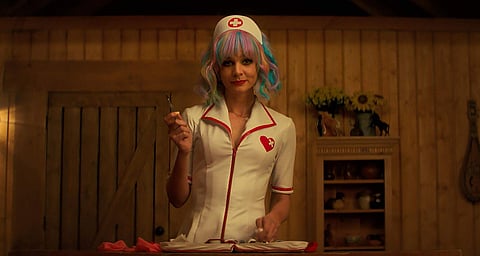

What does ‘being girly’ mean to you? The colour pink might pop up. You also think candy and candy floss? Or perhaps prancing sensuously in satin clothes with matching ribbons in the hair? Pillow fights, sure. Voices in shrill pitches with generous amounts of giggling? Lots of mascara-lined eye batting too, maybe. At least this is what men believe ‘girly’ to mean. What does the term actually mean though? It is holding your keys like you would a weapon. It is sharing your live location when you come home late. It is having your bag in front of you, so you don’t get groped. It is taking a longer route because it is safer. It is mapping exit routes, as soon as you enter a place.
The male gaze has been criticised in several films, but it’s perhaps never been as weaponised as in Promising Young Woman that got released recently in India. Cassie (a terrific Carrey Mulligan) is a med-school dropout who works at a coffee shop. Once a week, she dresses up and pretends to be too drunk to stand at a bar, waiting for a ‘nice man’ to help her. This ‘help’ usually means that he is going to exploit her state. Unless…
The makeup, the clothing, the provocation… It is all bait that writer-director Emerald Fennell lays to puncture the male gaze. The men say all the ‘right things’ and then proceed to do abominable things. Cassie, meanwhile, pretends to be drunk and vulnerable, only to shock them out of their senses at the moment. Promising Young Woman, that won an Academy Award for Best Original Screenplay, uses every female trope, from the seductress to the walk of shame. The film too is packaged as a candy-floss-themed chick flick — bright and warm hues of blue, pink, pastel and yellow often pop out. But there is subversion everywhere.
The ominous soundtrack and edgy performances do wonders to the suspense-thriller genre. Even an innocuous form of communication like text messages are shown to be terrifying for women. Also brilliant is how Cassie uses fear to extract revenge—the same fear that women carry around every day! Is it any surprise that women then tend to be overthinkers—if they don’t, who else is going to for us?
For most women, life is war. You either succumb to the patriarchy, or you fight. You need to be shrewd at all times because… well, how else do you survive on a battlefield? You do not get to relax or make mistakes. If you do, you are assigned blame. Why didn’t you help a friend who told you something bad happened to her? “Well, she shouldn’t have been drinking.” Why didn’t you stop your friend when he was assaulting a woman or taping it? “How is it my fault when he was the one who did it?!” Promising Young Woman accurately captures the lie bubbles we cushion ourselves in. It also shows how quickly we take refuge when confronted with the truth. The only person who acknowledges this is the lawyer who argues for the accused and wins cases for them. No wonder, he has a psychotic breakdown.
But the best part of PYW is that sucker punch of a climax. The end is a metaphor for how those at the top rung of the hierarchy (a white cishet man here) will always have the power to silence the truth to death, even if only by using a fraction of their resources. We live in a country where the court excuses a rape accused for being the ‘state’s future asset.’ There’s a similar question raised in PYW too. The Dean of their institute, a woman, brushes off Nina’s rape complaint saying that ‘they cannot ruin a promising young man’s career every time they get an accusation like this'. What about the promising young woman then?